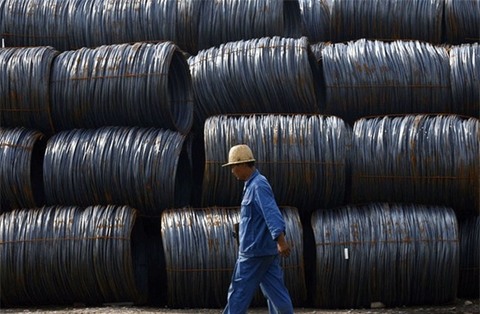
If the conflict occurred only between the US and China, Viet Nam would have a good chance to export to the US. — Photo giathep24h.vn
Fears of a trade war between the US and China have rocked global stock markets in recent sessions, but experts anticipate limited effects on Viet Nam’s securities market growth as the market is on solid footing and is increasingly reliant on domestic demand.
On March 22, US President Donald Trump signed a memorandum that would impose 25 tariffs on up to US$60 billion in annual imports from China. In retaliation, China announced similar tariffs on about $3 billion of US imports.
Though there is still speculation that China may expand its target to a broader range of US business interests, international experts believe the current trade spat between the two economic powers will be resolved through ongoing negotiations rather than moving toward a full-fledged trade war.
This issue, however, continues to weigh on investor sentiment and raise near-term volatility in global markets.
Viet Nam’s securities market performed better when the benchmark VN-Index declined for only two times in the past three weeks, gaining 4.5 per cent since March 9. The VN-Index has continued setting new record highs this week.
According to Nguyen Duc Hung Linh, head of analysis at Saigon Securities Inc, Viet Nam’s stock market is strong on its own, helping to ease the short-term impact of the US-China trade issue. They are the escalating equitisation process of State-owned enterprises (SOEs), listings of big companies, quick expansion of the market size and the possible upgrading of the local market to emerging market status.
Since early 2017, most of companies that have recently had large IPOs have seen their stock value increase, bringing profits to both domestic investors and foreign funds.
This trend is expected to continue in 2018 and more good investment opportunities will be offered for foreign investors in the future, Linh told an online seminar on risks and opportunities for Vietnamese businesses amid the threat of a global trade war on cafef.vn on March 29.
Exchange-traded funds (ETFs) were net buyers of VND5.4 trillion in the Vietnamese market in January but from early February until now, they have withdrawn about VND1 trillion.
According to Linh, domestic money inflows have remained strong and together with stable macroeconomic conditions, the market will continue to grow.
Limited impact
Responding to concerns over escalating trade tensions between the US and China and its impact on Viet Nam, Tran Toan Thang, head of the World Economic Department of the National Centre for Socio-Economic Information and Forecast (NCIF) under the Ministry of Planning and Investment, said: “No one wins in a trade war. All parties in this war will lose.”
According to Thang, a large-scale trade war will not likely occur as all parties are aware of the consequences but minor conflicts can happen.
If the conflict occurred only between the US and China, Viet Nam would have a good chance to export to the US, Thang said. He added that on the other hand, if China could not export to the US, it would boost its exports to other countries, including Viet Nam.
However, as Viet Nam’s economic openness as measured by its import-export rate is rather high, Thang warned that the country might find it difficult to achieve growth targets if a real trade war broke out.
According to Nguyen Huy Do, marketing director at Viet Nam-Italy Steel Co, Viet Nam can increase exports to other markets when the Comprehensive Progressive Trans Pacific Partnership (CPTPP) takes effect in the near future.
The CPTPP has 11 member countries. Viet Nam has the most favorable conditions for exporting garments and steel, Do said, adding that through the CPTPP Viet Nam will gain a good opportunity to export without challenge from its biggest competitor, China.
In addition, Viet Nam is a developing country, so the demand for construction steel is rising and the industry is less reliant on exports.
The steel industry witnessed a growth rate of 18 per cent in 2016 and 12-13 per cent in 2017. – VNS